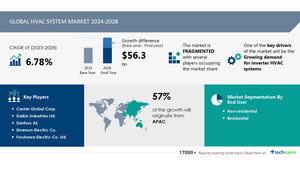NEW YORK, Oct. 23, 2024 /PRNewswire/ -- Report with the AI impact on market trends - The Global Bio Plasticizer Market size is estimated to grow by USD 803.8 million from 2024-2028, according to Technavio. The market is estimated to grow at a CAGR of 6.19% during the forecast period.Rise in number of applications of bio plasticizers across different industries is driving market growth, with a trend towards technological advancements of bio plasticizers. However, high cost of production of bio plasticizers poses a challenge - Key market players include ACS Technical Products, ARD, Avient Corp., BASF SE, Cargill Inc., DIC Corp., Dow Inc., Emery Oleochemicals Group, Evonik Industries AG, Goldstab Organics Pvt. Ltd., Grupo Princz IPASA, Hebei Jingu Co. Ltd, India Glycols Ltd., Jungbunzlauer Suisse AG, Lanxess AG, Matrica S.p.A, OQ Chemicals GmbH, Roquette Freres SA, Solvay SA, Valtris Specialty Chemicals, and Zhejiang Jiaao Enprotech Stock Co Ltd.
Key insights into market evolution with AI-powered analysis. Explore trends, segmentation, and growth drivers- View the snapshot of this report
Bio Plasticizer Market Scope |
|
Report Coverage |
Details |
Base year |
2023 |
Historic period |
2018 - 2022 |
Forecast period |
2024-2028 |
Growth momentum & CAGR |
Accelerate at a CAGR of 6.19% |
Market growth 2024-2028 |
USD 803.8 million |
Market structure |
Fragmented |
YoY growth 2022-2023 (%) |
5.36 |
Regional analysis |
North America, Europe, APAC, South America, and Middle East and Africa |
Performing market contribution |
North America at 34% |
Key countries |
US, Germany, China, Japan, and France |
Key companies profiled |
ACS Technical Products, ARD, Avient Corp., BASF SE, Cargill Inc., DIC Corp., Dow Inc., Emery Oleochemicals Group, Evonik Industries AG, Goldstab Organics Pvt. Ltd., Grupo Princz IPASA, Hebei Jingu Co. Ltd, India Glycols Ltd., Jungbunzlauer Suisse AG, Lanxess AG, Matrica S.p.A, OQ Chemicals GmbH, Roquette Freres SA, Solvay SA, Valtris Specialty Chemicals, and Zhejiang Jiaao Enprotech Stock Co Ltd |
Market Driver
The bio plasticizer market is experiencing significant growth due to technological advancements in this field. Companies are investing heavily in research and development to create eco-friendly, sustainable, and high-performing bio plasticizers. Key trends include the use of epoxidized vegetable oils, cardanol derivatives, and isosorbide plasticizers, which offer improved thermal stability, efficiency, and biodegradability. Major players like Evonik Industries AG and Cargill Inc. Are leading the way with innovative solutions, such as Evonik's bio plasticizers that are compatible with various polymers and have low migration and volatility rates. Dow Inc.'s Ecolibrium bio plasticizers, derived from vegetable oils, reduce carbon footprints and maintain desirable performance for various applications. These advancements will continue to drive the growth of the global bio plasticizer market in the coming years.
The Bio Plasticizer Market is experiencing significant growth due to increasing trends towards sustainable practices and resource efficiency in various industries. Textile manufacturers are turning to eco-friendly plastics for producing sustainable fabrics. Sustainable production of bio-based packaging and consumer goods is also on the rise, driven by consumer demand for eco-friendly alternatives. Bio-based plasticizers such as epoxidized soybean oil, citrates, castor oil, and glycol esters are gaining popularity due to their biodegradability and lower carbon footprint. These materials offer flexibility, durability, and workability, making them suitable for use in a wide range of applications. Environmental and health concerns have led to a ban on single-use plastics, driving demand for compostable products made from plant-based materials like starch and vegetable oils. The circular economy is also a key trend, with a focus on reducing waste and pollution through landfilling reduction and food loss prevention. Regulatory support for eco-friendly plastics, thermal stability, compatibility, and production complexity are important factors influencing market growth. Biodegradability, non-toxicity, and regulatory compliance are crucial considerations for companies seeking to meet consumer demands for sustainable and eco-friendly alternatives. The medical device industry is also adopting bio-based plasticizers for producing eco-friendly and biocompatible products. E-commerce is another sector driving growth, as consumers increasingly demand sustainable and compostable packaging solutions.
Request Sample of our comprehensive report now to stay ahead in the AI-driven market evolution!
- The global bio plasticizer market faced a significant challenge in 2023 due to the high cost of production. Renewable resources, such as vegetable oils, used in the production of bio plasticizers are expensive and volatile in price. The extraction, collection, storage, and processing of these oils into usable bio plasticizer compounds require advanced technology and energy-intensive processes, further increasing production costs. This high cost is a major concern for price-sensitive industries like automotive, construction, and consumer goods. The complex and expensive production process of bio plasticizers limits their adoption and growth in these markets during the forecast period.
- The Bio Plasticizer Market is experiencing significant growth due to increasing health concerns related to traditional plasticizers like phthalates. The shift towards biodegradable plastics and eco-friendly alternatives is gaining momentum, driven by single-use plastics bans and the demand for compostable products. The circular economy is also influencing the market, with a focus on vegetable oils, starch, and plant-based materials as sustainable options. Flexibility, durability, and workability are key considerations, along with thermal stability, compatibility, and biodegradability. Regulatory support and environmental awareness are crucial factors, with non-toxic materials like citrates, castor oil, succinic acid, and glycol esters gaining popularity. The market is expanding into various sectors, including medical devices, packaging industries, and agriculture, driven by corporate social responsibility and consumer demand for sustainable products. Continuous innovation is essential to meet the challenges of flexibility, durability, and cost-effectiveness, while addressing concerns around volatility and production complexity. The market is expected to grow in sectors like e-commerce, flooring, wall coverings, and biodegradable materials, as consumers prioritize eco-friendly alternatives and lifestyle improvement, and as water conservation becomes a priority. Polymer Additives are playing a vital role in enhancing the softness and carbon footprint reduction of these materials.
Discover how AI is revolutionizing market trends- Get your access now!
Segment Overview
This bio plasticizer market report extensively covers market segmentation by
- Product
- 1.1 Epoxidized Soybean Oil (ESBO)
- 1.2 Castor oil-based plasticizers
- 1.3 Citrates
- 1.4 Succinic acid
- 1.5 Others
- Application
- 2.1 Packaging materials
- 2.2 Automotive and transport
- 2.3 Consumer goods
- 2.4 Building and construction
- 2.5 Others
- Geography
- 3.1 North America
- 3.2 Europe
- 3.3 APAC
- 3.4 South America
- 3.5 Middle East and Africa
1.1 Epoxidized Soybean Oil (ESBO)- The Bio Plasticizer market is growing due to increasing demand for eco-friendly products. Businesses are shifting from traditional plasticizers to bio-based alternatives. Bio plasticizers are derived from renewable resources such as vegetable oils and fruits. They offer similar performance to petroleum-based plasticizers but with the added benefit of being biodegradable. This trend is expected to continue as regulations push for sustainable manufacturing processes. Companies are investing in research and development to improve the production and performance of bio plasticizers.
Download a Sample of our comprehensive report today to discover how AI-driven innovations are reshaping competitive dynamics
Research Analysis
The Bio Plasticizer market is witnessing significant growth due to the increasing demand for sustainable practices in various industries, particularly in textiles and consumer goods. Resource efficiency and waste reduction are key drivers as the world grapples with pollution issues. Bio-based packaging is gaining popularity as an eco-friendly alternative to traditional plastics, reducing the need for landfilling and addressing food loss. Epoxidized soybean oil and vegetable oils are commonly used as bio-plasticizers in the production of eco-friendly plastics. Biodegradable plastics made from plant-based materials offer flexibility, durability, and workability, making them suitable for various packaging applications. Environmental and health concerns, as well as regulatory requirements, are pushing the market towards sustainable solutions. The market for bio-plasticizers is expected to grow as consumers become more environmentally aware and demand eco-friendly alternatives, including in medical devices.
Market Research Overview
The Bio Plasticizer Market is witnessing significant growth due to the increasing demand for sustainable practices in various industries. Resource efficiency and waste reduction are key focus areas as concerns over pollution continue to mount. Bio-based packaging and eco-friendly plastics are gaining popularity in consumer goods industries, as consumers become more environmentally aware. Composting infrastructure and landfilling reduction are also driving the market, as biodegradable plastics become a viable alternative to single-use plastics. Food loss is another area where bio plasticizers are making an impact, as they are used in flexible packaging to extend the shelf life of perishable goods. Epoxidized soybean oil, polyvinyl chloride, and other vegetable oils, starch, and plant-based materials are popular bio plasticizers. Flexibility, durability, and workability are essential factors in their selection. Environmental and health concerns are also driving the market, as biodegradable plastics offer a more sustainable alternative to traditional plastics. Regulatory support for eco-friendly alternatives is increasing, with a growing number of countries implementing bans on single-use plastics. The circular economy is another trend driving the market, as companies seek to reduce their carbon footprint and promote sustainable production. Bio plasticizers are also used in non-packaging applications such as medical devices, flooring, wall coverings, and bio-fertilizers. Continuous innovation in the field is driving the market, with new bio plasticizers such as citrates, castor oil, succinic acid, glycol esters, and other non-toxic materials being developed. The market is expected to continue growing as consumers and businesses seek more sustainable and eco-friendly alternatives to traditional plastics. The packaging industries are a significant consumer of plasticizers, with continuous innovation and the need for eco-friendly alternatives driving demand. E-commerce and lifestyle improvement are also contributing to the growth of the market, as consumers seek convenient and disposable packaging options. Water conservation is another area where bio plasticizers are making an impact, as they are used in the production of eco-friendly chemicals and polymers. In conclusion, the Bio Plasticizer Market is experiencing significant growth due to the increasing demand for sustainable practices, resource efficiency, and waste reduction. Biodegradable plastics offer a viable alternative to traditional plastics, and the market is expected to continue growing as consumers and businesses seek more eco-friendly and sustainable solutions. The use of vegetable raw materials, continuous innovation, and regulatory support are key factors driving the market.
Table of Contents:
1 Executive Summary
2 Market Landscape
3 Market Sizing
4 Historic Market Size
5 Five Forces Analysis
6 Market Segmentation
- Product
- Epoxidized Soybean Oil (ESBO)
- Castor Oil-based Plasticizers
- Citrates
- Succinic Acid
- Others
- Application
- Packaging Materials
- Automotive And Transport
- Consumer Goods
- Building And Construction
- Others
- Geography
- North America
- Europe
- APAC
- South America
- Middle East And Africa
7 Customer Landscape
8 Geographic Landscape
9 Drivers, Challenges, and Trends
10 Company Landscape
11 Company Analysis
12 Appendix
Technavio is a leading global technology research and advisory company. Their research and analysis focuses on emerging market trends and provides actionable insights to help businesses identify market opportunities and develop effective strategies to optimize their market positions.
With over 500 specialized analysts, Technavio's report library consists of more than 17,000 reports and counting, covering 800 technologies, spanning across 50 countries. Their client base consists of enterprises of all sizes, including more than 100 Fortune 500 companies. This growing client base relies on Technavio's comprehensive coverage, extensive research, and actionable market insights to identify opportunities in existing and potential markets and assess their competitive positions within changing market scenarios.
Contacts
Technavio Research
Jesse Maida
Media & Marketing Executive
US: +1 844 364 1100
UK: +44 203 893 3200
Email: [email protected]
Website: www.technavio.com/
SOURCE Technavio

WANT YOUR COMPANY'S NEWS FEATURED ON PRNEWSWIRE.COM?
Newsrooms &
Influencers
Digital Media
Outlets
Journalists
Opted In





Share this article